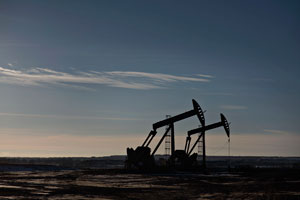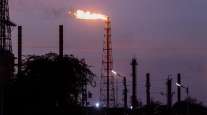Oil Prices Expected to Average $40 a Barrel in 2016

Oil prices will average just over $40 a barrel this year due to subdued demand and the likelihood a tentative agreement by leading producers to freeze output will do little to drain a supply glut, a Reuters poll showed Feb. 29.
The price, which has fallen by 45% in the last 12 months, is unlikely to recover much beyond its current levels around $34 a barrel until the second half of the year, when output from producers outside OPEC is expected to decline.
The survey of 30 economists and analysts forecast benchmark Brent crude will average $40.10 a barrel, down $2.40 from last month's poll. Brent crude, which averaged about $54 a barrel in 2015, has averaged $32.57 so far this year.
This is the ninth successive monthly Reuters poll in which analysts have lowered their price forecasts.
Russia and OPEC members Saudi Arabia, Qatar and Venezuela have agreed to work on a global deal to freeze oil output at January levels if other producers follow suit in a bid to tackle the global crude glut and support prices.
But Iran is planning to ramp up its output following the end of Western sanctions and has said the proposal is "laughable."
Iraq has also said it will boost production.
"While it's the first coordinated supply move of any kind by OPEC members and Russia in the past 15 years, it is clear that any deal without Iranian and Iraqi participation will do little to tighten the market, at least in 2016," Raymond James analyst Luana Siegfried said.
Analysts are also skeptical that freezing production near record levels will support the market.
Oil prices have fallen 70% since mid-2014 due to surplus crude piling up and a decision by the Organization of the Petroleum Exporting Countries in late 2014 to refrain from cutting output to shore up prices, as it had done for decades.
The analysts polled believed supply and demand would not be balanced until late 2016, though the gap between the two is expected to narrow compared with last year.
"Although supply will not meet demand before 2017, anticipation of less oversupply should be supportive for oil prices," ABN AMRO senior energy economist Hans Van Cleef said.
"I believe that this agreement is a clear signal that some of the major oil producers indicate that oil prices should not go lower from current levels."
Global demand growth would likely remain subdued in the medium term due to a slowing Chinese economy and a decline in consumption in OECD countries on improving energy efficiencies and a shift towards cleaner fuels, the analysts said.
Analysts see U.S. crude futures averaging $38.90 a barrel in 2016, down $2.10 from the January poll forecast. West Texas Intermediate (WTI) has averaged $31.03 a barrel so far in 2016.
Morgan Stanley had the lowest 2016 forecast for Brent at $30 a barrel, while Raymond James had the highest at $53.




